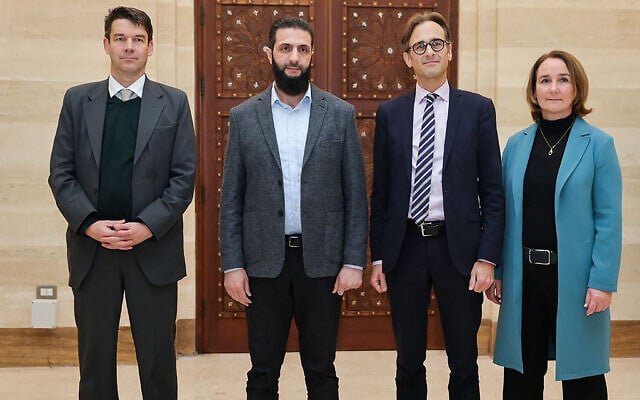Ahmed al-Sharaa, the new de facto leader of Syria, defended telling a woman to cover her hair before being photographed with him after viral video of the incident ignited fears that post-Assad Syria could be veering toward a fundamentalist Islamic regime.
“I did not force her. But it’s my personal freedom. I want photos taken for me the way that suits me,” Al-Sharaa, who has recently stopped using his nom de guerre Abu Muhammad al-Julani, told the BBC in an interview.
The rebel chief has received backlash from both liberals and conservative Islamists upon asking the woman, Lea Kheirallah, that she cover her hair while he toured Damascus’s Messeh area on December 10. Kheirallah complied, pulling her hood over her head.
The incident raised fears among liberal media outlets that al-Sharaa could seek to institute strict dress codes in Syria just as his group Hayat Tahrir al-Sham — a former al-Qaeda affiliate — did upon seizing control of the Idlib province in 2017. Those restrictions, however, were softened in recent years following public criticism.
France 24’s Arabic channel published a headline asking whether Syria was headed toward “Islamic rule.” According to the BBC, one Syrian journalist said, “We replaced one dictator with a reactionary dictator,” and social media commentators wrote that “ultra-extremists” may be rising to power and that al-Sharaa “forced a free woman” to cover her hair.
Meanwhile, conservative Islamists criticized al-Sharaa on Telegram for being photographed at all with a woman, which is considered by some to be immodest in Islam. According to the BBC, most of the critics appear to be from the Idlib region and include clerics and influential commentators, some having previously been members of Hayat Tahrir al-Sham.
Some critics called al-Sharaa’s behavior “indulgent” and that he was seeking “vain public attention” and “too busy taking selfies with young ladies” instead of addressing demands to release prisoners held in his organization’s jails in Idlib.
For her part, Kheirallah said al-Sharaa’s request did not bother her, adding that he asked in a “gentle and fatherly way.”
“It was his right to appear in a manner befitting his principles. He didn’t ask the women around him to cover their hair, but if they wanted to be photographed with him, the same standard applied even for the American journalist who interviewed him,” Kheirallah wrote in an Instagram post.
Nevertheless, a photograph published by the Syrian Arab News Agency showed al-Sharaa posing with a German foreign ministry delegation that included a woman whose hair was uncovered.
Seeking a contrast to his past as an al-Qaeda commander, al-Sharaa has portrayed himself as a moderate since toppling the Assad family’s 50-year rule on December 8. He has insisted that the rights of all Syrians will be protected and that he is committed to the 1974 ceasefire agreement with Israel.
Following Assad’s ouster, the Israel Defense Forces seized a buffer zone between Israel and Syria that was previously manned in part by Syrian troops, who abandoned their posts amid the regime’s collapse. Israel has repeatedly said that control of the buffer zone and some areas beyond it is a temporary defense measure amid the chaotic takeover.
On Monday, al-Sharaa said that Israel had reason to involve itself in the fighting in Syria while the Assad regime — which was backed by Iran and Lebanon’s Hezbollah terror group — was still standing, but that now “the excuse is gone.”
“There is no justification for the Israelis to bomb Syrian facilities or advance inside Syria,” he said, according to the Wall Street Journal.
The Islamist leader told foreign journalists that his nascent government intends to overhaul Syria’s constitution and institutions, but said it will take time, and that the country is not yet ready for elections due to remaining disorder, some 13 years after civil war broke out amid the so-called Arab Spring in 2011.
Many countries and organizations have welcomed Assad’s fall but said they are waiting to see how the new authorities will treat minorities in the country.
